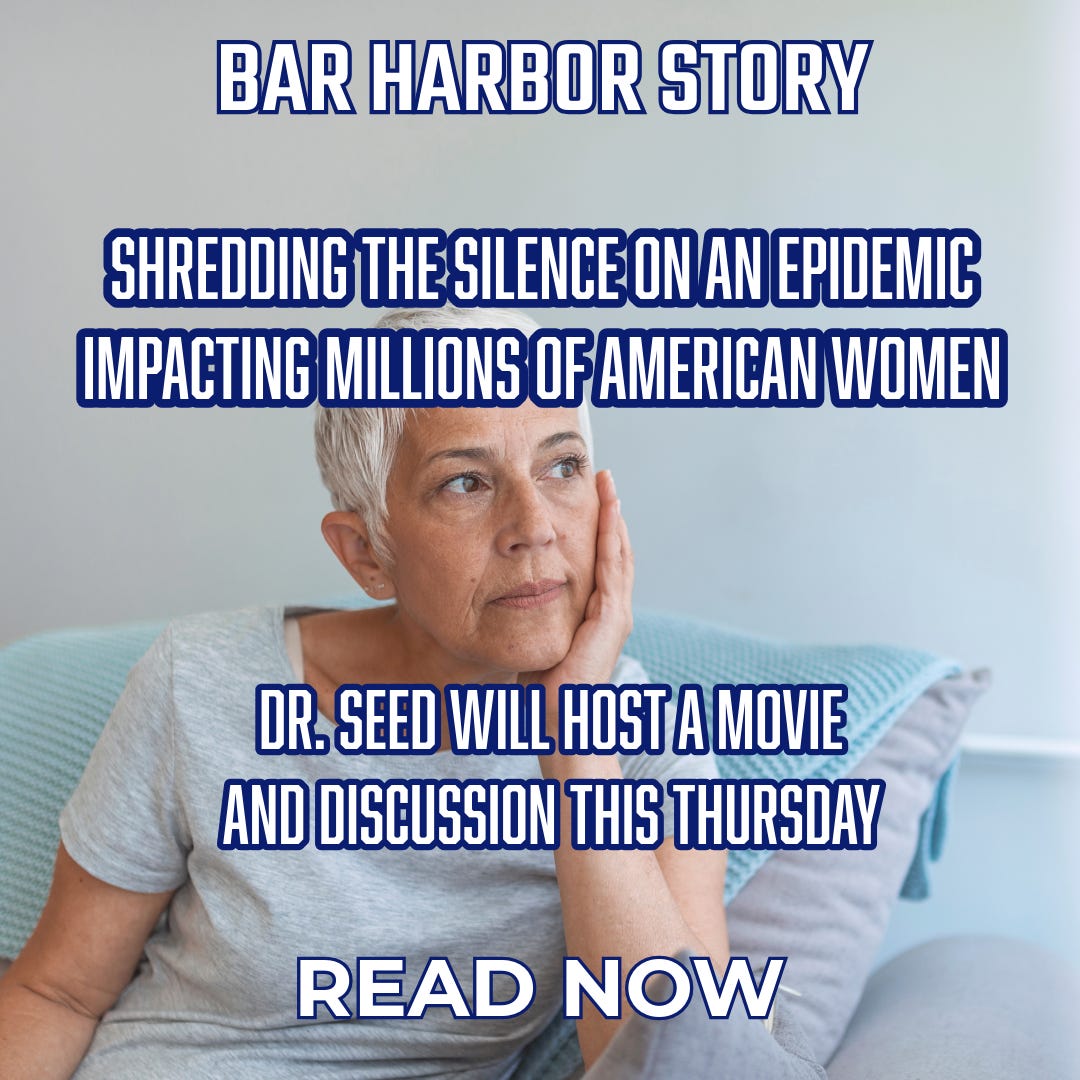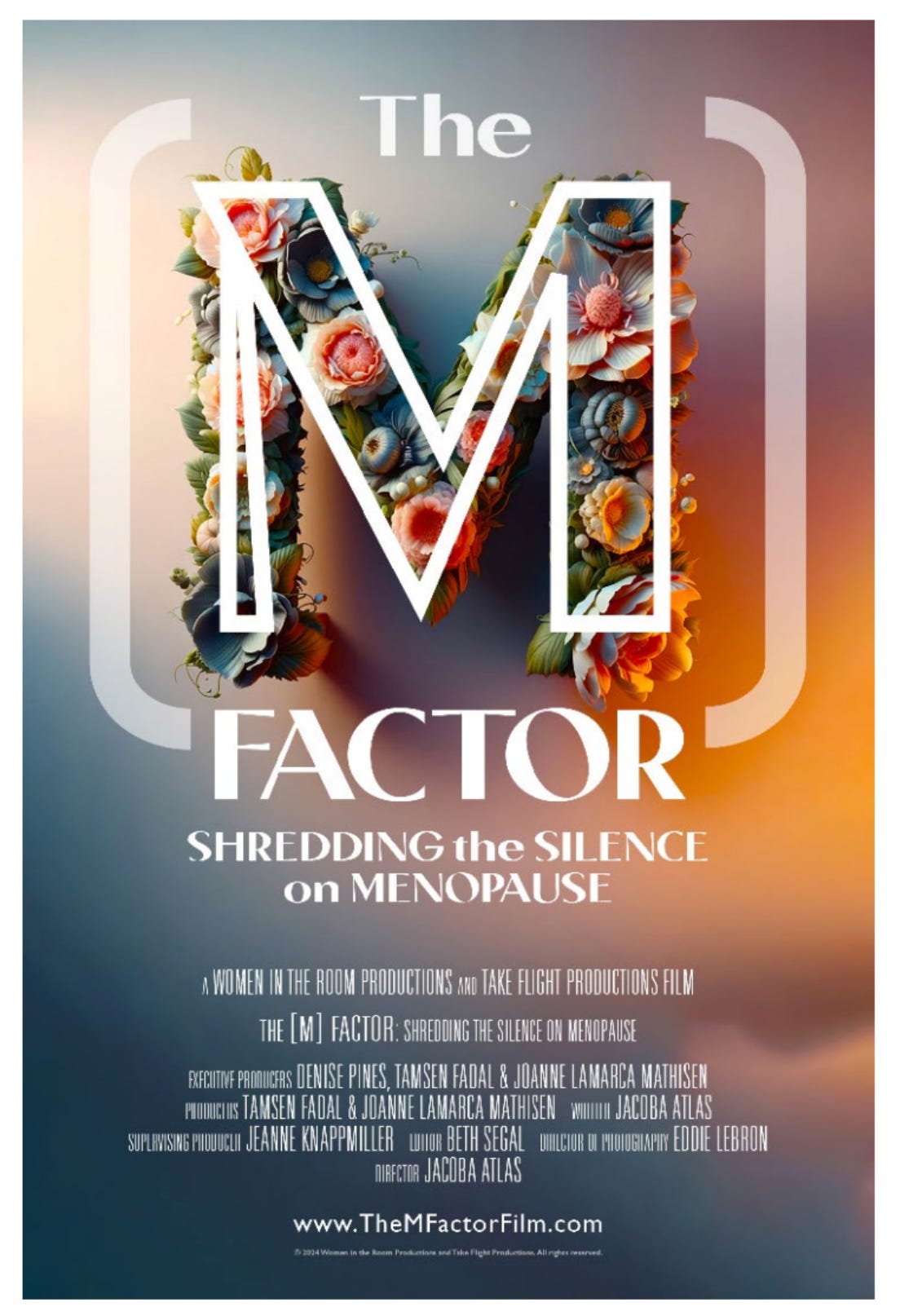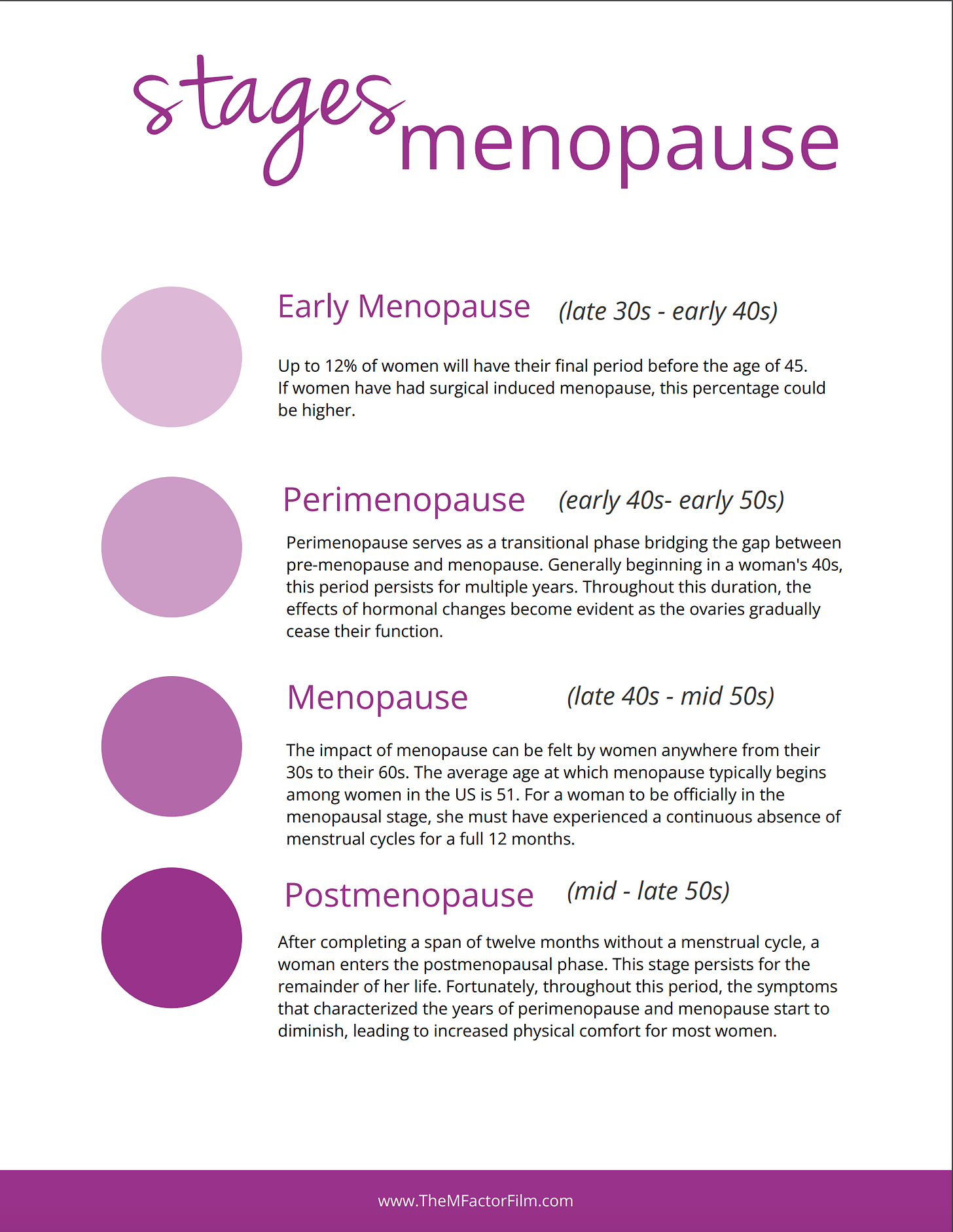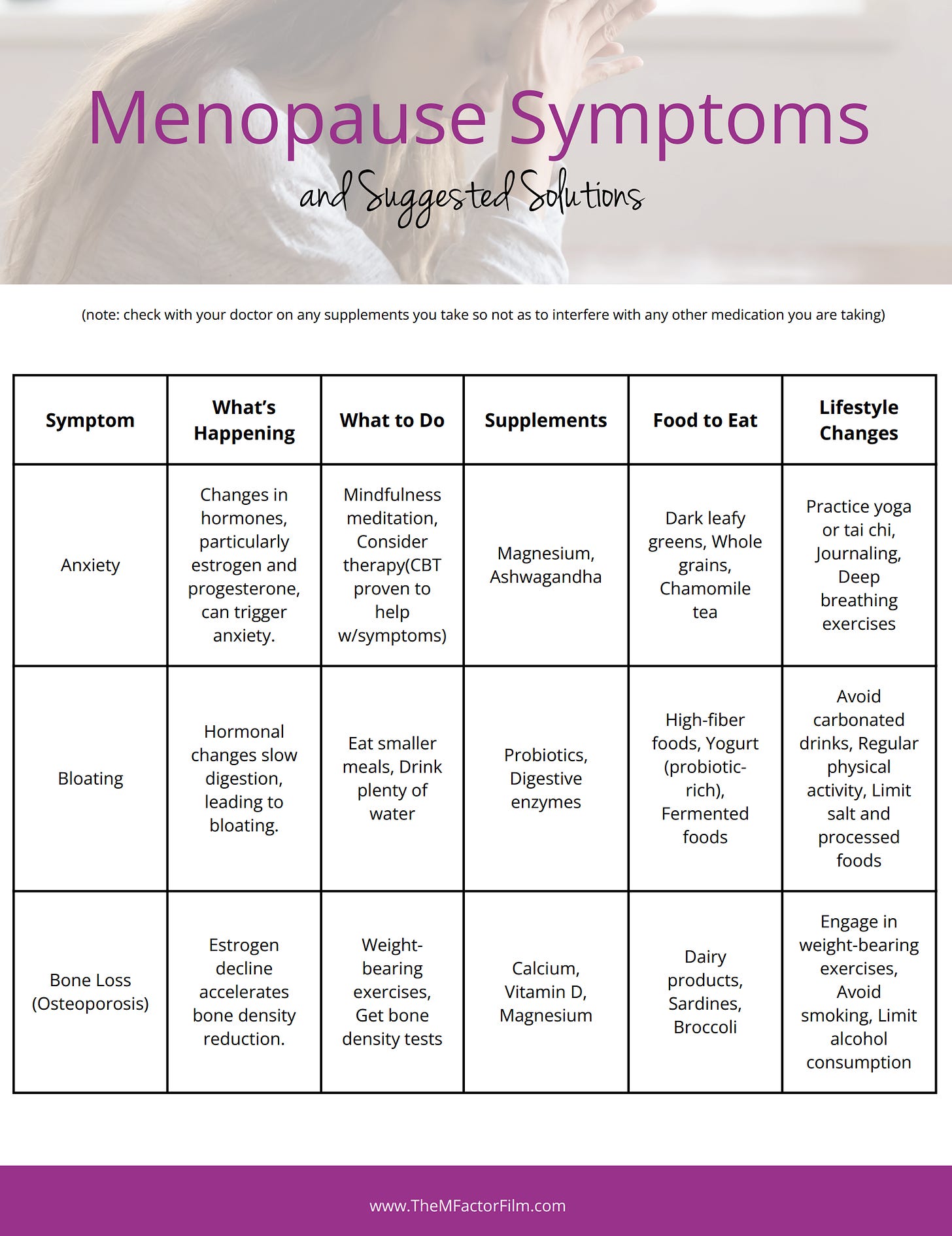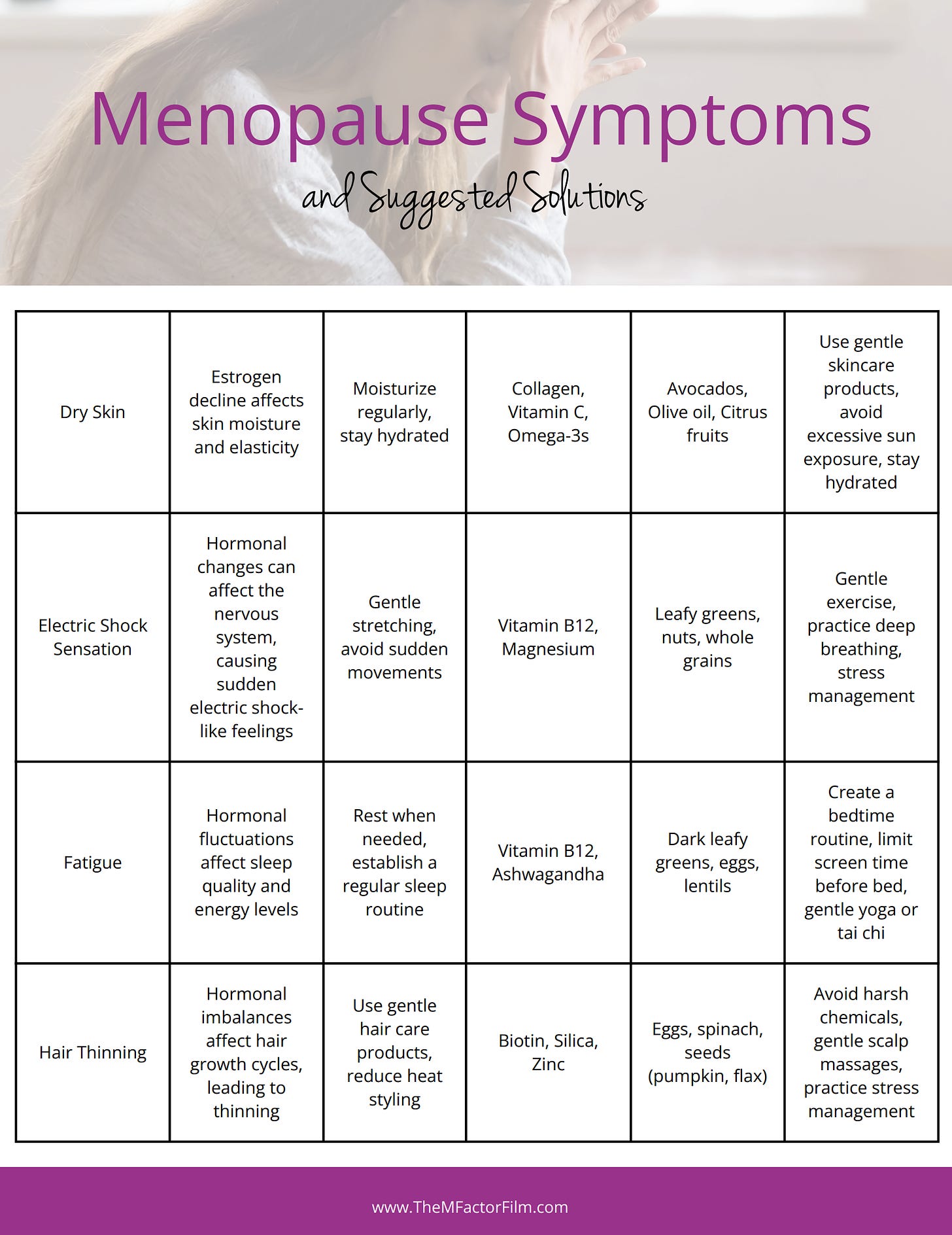Shredding the Silence on an Epidemic Impacting Millions of American Women
Dr. Seed will host a movie and discussion this Thursday
The Bar Harbor Story is generously sponsored by Swan Agency Real Estate.
TOWN HILL—Dr. Christy Seed, a family physician and founder of Acadia Integrative Medicine and Primary Care, has a goal.
“I'm trying to figure out ways to spread science-based information to women (and men!) about the menopause transition and treatment options,” she said.
She’s starting with a movie. The film is called “The M-Factor, Shredding The Silence on Menopause.” She will be showing it on Thursday, November 14, at 6:30 p.m. at her office, Acadia Integrative Medicine, 1344 State Highway 102 in Bar Harbor.
Dr. Seed sent two images to help illustrate this article. The first one is AI produced and of a “woman experiencing hot flashes from menopause.” She looks pretty calm about it and maybe even powerful.
Power often comes from facts, which often comes from research. As science and research change, so too does how bodies are treated and cared for.
The movie, according to its site on PBS, “confronts the neglected menopause crisis, challenging societal and medical shortcomings, and advocating for a revolutionary approach to women's health in America where she’s prepared for midlife.”
According to the site, “Menopause sets in after an individual has passed a full year without experiencing a menstrual period. However, the period leading up to this time is known as perimenopause. This period generally extends for a span of three to seven years. Throughout the perimenopausal phase, there will be variations in the levels of estrogen and progesterone, accompanied by several physical and physiological transformations.”
It’s considered a silent epidemic that impacts millions of American women.
“In addition to experiencing traumatic physical symptoms, women are struggling with the related stresses of billions of dollars in lost wages, upended careers, family disruptions, and emotional chaos,” according to the site.
Approximately 80% of women have joint pain, sleep disruptions, decreased sexual functions, hot flashes, UTIs, and mental health issues during menopause. Of those, 1 in every four women have reported it imapacted their career or employment opportunities. Approximately 17% have quit their jobs. Yet, evidence-based interventions for those symptoms have only made their way to 15% of those women.
“This film confronts this neglected crisis, challenges societal and medical shortcoming and advocates for a revolutionary approach to women's health in America,” the site says.
THE INTERVIEW
Dr. Seed was kind enough to respond to some quick interview questions. She’ll also host a 30-minute discussion after the hour long film.
Dr. Seed requests that people RSVP to make sure her office has enough space for those who want to attend. You can do so at Acadiaintegrativemedicine@gmail.com
Can you tell me what inspired you to want to increase awareness about menopause?
The Women's Health Initiative study results published in 2002 rocked the medical world and resulted in a dramatic reduction in the use of hormone replacement therapy due to fears of adverse outcomes. I was in medical school when the study was published and the message that I took away from my training was that there really wasn't much that could be done for women suffering from menopause related symptoms and that hormone replacement (which was really the only option for treatment) was to be prescribed ONLY if the woman was so severely affected that the huge risk was worth it.
Women's health has always been a significant part of my practice, but I will admit that when women came in with concerns about menopause, I always felt somewhat overwhelmed because I felt like I had very little training on what menopause really entailed and even less training on what I could do to help with symptom management.
When the medical community started to take another look at the WHI results and the consensus that HRT actually can be used safely for many women, it was exciting and piqued my curiosity and desire to be able to learn more. I took time to study about menopause so I could take the North American Menopause Society's certifying exam.
Having taken these steps I feel that I have a much better understanding of what women can expect and how to help them with both conventional HRT and other pharmaceuticals as well as integrative medicine treatment strategies.
What’s the one thing you’d like people to know about menopause transition?
I want women to understand what changes they may experience so that they are not blindsided. Most importantly, I want them to feel heard and know that there are lots of things that can be done to help if they experience undesirable symptoms.
You’re a very science-based human, what do you think is the most important (or top three important) science-based bits of knowledge that people might not know?
#1 is that treatment for menopause should be based on an individual's health status. What works and is recommended for one woman could be very different then what is recommended for another woman. There's a lot out there on social media right now about the "right" treatment for menopause, but it really depends on the individual.
The transition to menopause can take many years. Symptoms leading up to menopause can last from 2-8 years and often continue after menopause.
There are LOTS of symptoms that can be associated with menopause and mental health changes are very common. Between 20%-40% of women experience depression around menopause!
A healthy lifestyle can reduce some of the adverse symptoms associated with menopause. A healthy diet, exercise and regular sleep as well as avoiding alcohol and smoking have all been shown to be effective ways to make the menopause transition easier.
Why did you choose this movie to screen?
This film just was released three weeks ago and has the most up-to-date information about menopause. I like their approach which is to help women have a better understanding of the menopause transition and some of the treatment options. I think the film also does a great job of helping women feel less isolated by breaking the silence about menopause.
Why do you think there has been so much silence about menopause in conversation and in research?
I have so many responses to this question but will just give you my top three....
1. Women's healthcare has always been marginalized and aging is seen in a negative light. When you put the two together (ie aging women) there is little support or interest. Women have been made to feel shame about what is happening as their bodies age and particularly as they experience the menopause transition. The shame leads to silence and suffering.
2. When conventional medicine doesn't have effective treatment strategies for a particular condition the patients who suffer from it often get ignored. I think this is a somewhat common psychological coping mechanism for physicians. Most doctors go into medicine because they want to help and they are trained to make things better for patients. But, when a doctor runs into a situation in which there isn't an effective treatment, it's often uncomfortable as they can't do what they were trained to do ... help! Often this leads to physicians avoiding patients and their concerns because they feel they have no effective treatment strategies or ways to help.
3. Because every woman will experience menopause it has often been looked at as just a "normal" experience. Women have been told that what they are experiencing is just a "normal" part of aging and therefore they should be able to handle it. Obviously, there is bias.... Erectile dysfunction is a "normal" part of aging as well, but we sure have some great treatments for it!
I just went through the list of symptoms and said, “Wow. This is amazing. I have that!” And “I remember when my mom had that.” And “This friend just had this start. Oh. I wonder if menopause is why."So, thank you for that, too. Do you think a lot of women might be shocked to find that certain symptoms they are having (memory issues, joint pain, headaches, etc.) might be part of undergoing menopause?
Yes! I think a lot of women experience symptoms that are not recognized to be associated with menopause and a trial of treatment may make a difference!
TO FIND OUT MORE:
Acadia Integrative Medicine is a unique medical practice dedicated to providing exceptional, personalized direct primary care and integrative health consultations to each and every patient.
The M Factor’s PBS site
Menopause 101 (via PBS)
A Workplace Guide (via PBS)
Some Organizations
Black Girl’s Guide to Surviving Menopause
Black Women’s Health Imperative i
Center for Black Women’s Wellness
Some Podcasts
Menopause Masterclass with Tamsen Fadal
WisePause Lifestyle Series hosted by Denise Pines
You Are Not Broken with Kelly Casperson, MD
Some Books
Grown Woman Talk: Your Guide to Getting and Staying Healthy by Sharon Malone, MD
Built to Move: The Ten Essential Habits to Help You Move Freely and Live Fully by Kelly Starrett and Juliet Starrett
Estrogen Matters: Why Taking Hormones in Menopause Can Improve Women’s Well-Being and Lengthen Their Lives — Without Raising the Risk of Breast Cancer by Avrum Bluming and Carol Tavris
Hormone Intelligence: The Complete Guide to Calming the Chaos and Restoring Your Body’s Natural Blueprint for Well-Being by Aviva Romm, MD
Menopause Bootcamp: Optimize Your Health, Empower Your Self, and Flourish as You Age by Suzanne Gilberg-Lenz, MD
The Essential Oils Menopause Solution by Dr. Mariza Snyder
The Hormone Cure by Sara Gottfried, MD
The Sleep Fix by Diane Macedo
The Wisdom of Menopause by Christiane Northrup, MD
The New Menopause: Navigating Your Path Through Hormonal Change with Purpose, Power, and Facts by Mary Claire Haver, MD
The New Rules of Menopause: A Mayo Clinic Guide to Perimenopause and Beyond by Stephanie S. Faubion, MD, MBA
The Menopause Brain: New Science Empowers Women to Navigate the Pivotal Transition with Knowledge and Confidence by Lisa Mosconi, PhD
The Menopause Reset: Get Ride of Symptoms and Feel Like Your Younger Self Again by Dr. Mindy Pelz
Estrogen Matters by Avrum Bluming, MD, and Carol Tavris, PhD
If you’d like to donate to help support us, you can, but no pressure! Just click here.
If you’d like to sponsor the Bar Harbor Story, you can! Learn more here.





